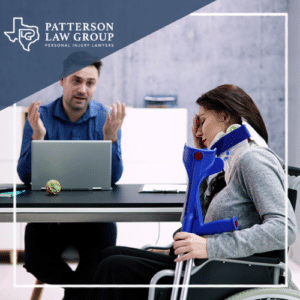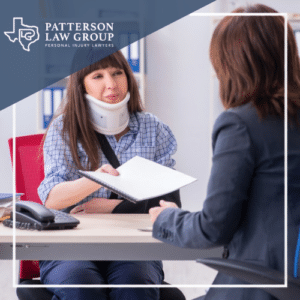
No one expects to be seriously injured in an accident. But the reality is people are hurt every day by circumstances that could and should have been prevented. If you or someone you care about is hurt in a slip and fall, a motor vehicle wreck, or some other type of accident, compensation for medical costs and other losses may be possible.
Our guide to Texas personal injury claims will explain common accidents and injuries we see, how the law works regarding personal injury claims, and the first steps you should take if you are injured due to someone else’s negligence.
Texas Accident and Injury Statistics
To understand just how many people are impacted by unexpected injuries and illnesses, it’s helpful to look at accident data across the state of Texas. According to a report from the Texas Department of State Health Services Office of Injury Prevention, there were nearly 134,000 non-fatal hospital visits across the state in a single year.
Falls were the leading cause of these hospital visits, followed by motor vehicle accidents, struck-by/against accidents, and cuts and piercing injuries. Although firearm injuries accounted for the fewest hospital visits, these injuries have been steadily increasing since 2018, which is the first year included in the report. The three-year study concluded that most reported fatal and non-fatal injuries were unintentional or accidental.
Common Accident Injuries
According to data from the Centers for Disease Control and Prevention (CDC), accident patterns across the nation are similar to those in Texas. Falls are the leading cause of unintentional injuries across all ages and genders, with more than 300 emergency room visits reported per 10,000 people nationwide.
Common accident injuries include:
- Amputations
- Broken bones
- Burns
- Crush injuries
- Disfigurement
- Internal bleeding
- Joint damage
- Lacerations and punctures
- Spinal cord injuries (including partial or full paralysis)
- Sprains and strains
- Traumatic brain injury (TBI) (including concussion)
- Whiplash
Emotional Distress Can Be Life-Changing
Beyond the physical pain and disability that come with a physical injury, we must also consider the mental anguish many experience after a traumatic event. People who are involved in or witness a tragic event can have trouble processing their experience, especially if they are seriously hurt.
It’s not uncommon for emotional pain to linger long after the physical scars have healed. It can manifest as mood disorders like anxiety, depression, and post-traumatic stress disorder. These conditions can make it difficult to work, attend school, socialize, and sleep.

Steps to Take After an Injury
If your life has been changed by an accident that wasn’t your fault, it’s important to take the proper steps to protect yourself and your interests.
Get Medical Attention
After an accident, your health should always be your first priority. Seek medical help right away if you have pain, mobility problems, confusion, unexplained bleeding, or any other signs of an injury.
If you don’t call an ambulance at the scene, be sure to see your healthcare provider soon after. Not all injuries are immediately obvious. If the damage is internal, you may not even know you are hurt.
Delayed-onset injuries like whiplash and TBI may come on or get worse in the hours and days after the initial accident. You may feel okay because the adrenaline masks the pain, only to push yourself and make your condition worse.
It’s always a good idea to get checked out after an accident to rule out injuries you may not notice right away. Save copies of your medical reports and other records in case you decide to take legal action.
Gather Evidence
Whether you were hurt in a fall, an auto wreck, or another type of accident, details from the scene may be essential to your case.
For example, let’s say you are shopping at a nearby grocery store. As you go to leave, you grab onto the handrail in front of the store, but it comes loose from the wall. Your hand slips, causing you to lose your balance and fall to the ground.
The result is a broken arm—along with some bruises, cuts, and scratches. The business owner is apologetic, stating she’s been meaning to fix the loose railing. Pictures of the broken railing can be the crux of your case. If you’re able, use your mobile phone to take photos, or ask someone nearby to assist you.
If anyone witnessed your fall and heard the business owner mention the broken railing, ask for their contact information as well. Their testimony will help you build a strong case for compensation.
Consult a Personal Injury Lawyer
Once you have received the appropriate medical attention, and have collected evidence from the accident scene, it’s time to contact a Arlington personal injury attorney for guidance. A cost-free initial case consultation is a good way to discuss your situation and learn your options.
How Can an Arlington Personal Injury Lawyer Help?
It takes skill and experience to recover compensation for personal injury clients. Without a compelling case built on facts and evidence, the settlement or verdict you deserve may be lost. Your lawyer has many different roles when it comes to your case—all of them are essential.
As your legal representative, it’s our job to:
- Investigate the details surrounding your accident
- Determine who was at fault based on the facts
- Collect the evidence necessary to build a solid case
- Calculate your economic and non-economic damages
- Manage all communications on your behalf
- Oversee your claim at every stage of the process
Types of Personal Injury Accidents We Handle in Arlington, TX
At Patterson Law Group, we handle a wide range of personal injury claims. Our practice areas include:
- Truck accidents
- Bicycle accidents
- Pedestrian accidents
- Slip and fall accidents
- Wrongful death claims
- Motorcycle accidents
- Car accidents
Your dedicated legal team oversees your case from start to finish, always keeping you updated on our progress. We strive to give you peace of mind knowing your claim is in good hands—so you can focus on your recovery.
Proving Negligence for An Accident Injury
Another part of our job is to prove negligence occurred. While that might seem fairly straightforward after a preventable accident, your case must meet specific criteria for the defendant to be found negligent:
The criteria for negligence in Texas personal injury claims are:
- Duty of care: The defendant had a duty to act in a way that prevented your injury.
- Breach of duty: The defendant failed to fulfill that duty.
- Causation: That breach of duty, or failure to act, directly led to your accident and injuries.
- Proximate cause: Any reasonable or prudent individual should have known that a breach of duty would create a risk to others.
- Damages: The plaintiff must have sustained compensable damages from the accident.
Let’s go back to our example of the broken handrail mentioned above. In this case, the store owner had a duty to ensure her space was safe and free of hazards. By not repairing the broken handrail in a timely manner, she breached that duty—causing your injury and your medical bills. It’s clear that negligence occurred in this situation.
Compensation for Texas Personal Injury Claims

- Economic damages have a specific dollar amount and include things like hospital bills and lost income. These expenses can be verified with receipts, pay stubs, and other documentation.
- Non-economic damages are a bit more challenging to quantify and prove. They refer to things like pain and suffering, mental anguish, and the loss of enjoyment of life caused by a debilitating injury.
- Punitive damages are added to the other two types of damages, but they are more difficult to obtain. They are used to punish the defendant and are typically awarded in cases of extreme negligence, like drinking and driving or knowingly selling a dangerous and defective product, for example.
What Is the Statute of Limitations for Personal Injury Claims in Texas?
Under Texas law, you typically have two years “after the day the cause of action accrues” to bring a personal injury claim. If you allow too much time to pass after an accident, you increase the risk of losing evidence or of key witnesses forgetting what they saw.
Because delays can potentially weaken your case, it’s best to schedule a consultation with a Arlington personal injury lawyer at Patterson Law Group as soon as possible after an accident.
Work With Leading Arlington Personal Injury Lawyer
Patterson Law Group was founded to do just one thing and do it well: fight to protect the rights of injured accident victims. Each and every day, we work hard to provide access to justice for all those who are hurting, regardless of the severity. Our team of attorneys has been both locally and nationally recognized for their work.
Our personal injury attorneys in Arlington can help investigate your accident, determine liability, and put together a case that will earn you the compensation you deserve. Schedule an initial consultation to have your case reviewed for free.



